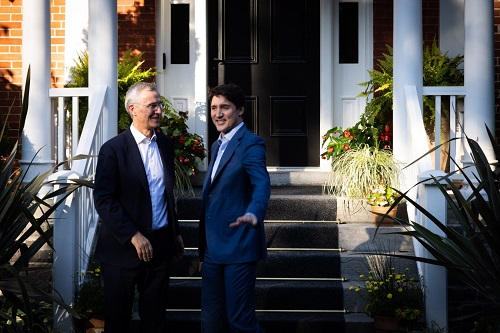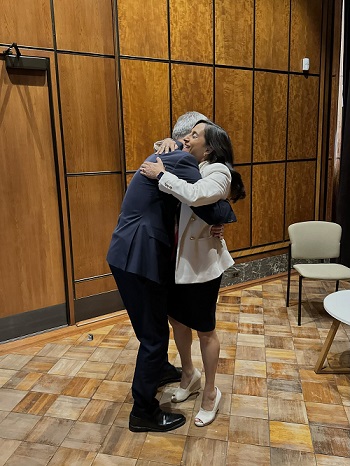NATO insists: “We want more money from Canada”, and everyone falls into line
OTTAWA – Canada must reach NATO’s minimum defense spending target and present a plan on how to achieve it to demonstrate to authoritarian regimes that Western allies are aligned: what the secretary general of the Atlantic Alliance, Jess Stoltenberg, said on Wednesday in Canada, it sounds a bit like a “diktat”. As is known, according to data released by NATO itself this week, Canada is expected to spend 1.37% of its gross domestic product on defense this year, well below the 2% target. “Canada’s position in NATO is strong, but we expect all allies to keep their promise to invest 2%” Stoltenberg said at the event hosted by the NATO Association in Ottawa.
Then, on the sidelines of the meeting, Stoltenberg himself published a “tweet” on X – Twitter, with a photo together with Trudeau (it’s the pic above, from his X profile – @jensstoltenberg): “Great to see my friend & Prime Minister Justin Trudeau to thank him for Canada’s contributions to NATO. At the upcoming NATOSummit we will take important decisions on deterrence & defence, support for Ukraine, and our global partnerships” Stoltenberg wrote.
For his part, the Canadian federal defense minister, Bill Blair, has once again promised that the objective (of 2%) will eventually be achieved, since Russia’s war in Ukraine raises a threat of expansion of the conflict in Europe (the last year, NATO members agreed that 2% should be the minimum, in light of concern over Russia’s invasion of Ukraine). Stoltenberg acknowledged that it is difficult for politicians to prioritize defense over social services, but said a precondition for success in any Western country is preserving peace and investing in security. Canada faces the same challenges as all allied countries with budgets, he said. “They’re worried about fiscal balance. They want to spend money on health care, education and other things” he said. But ultimately, if these countries are unable to prevent war, their efforts on health, education and climate change “will fail” he said.
His remarks on spending received enthusiastic applause at the NATO Association meeting, including – as the Canadian Press reports – from Anita Anand, former defense minister, who “snuck” behind the scenes to listen to the general secretary’s remarks of the Atlantic alliance. Anand herself, however, had “chilled” NATO on the eve of Stoltenberg’s arrival in Canada, declaring that it makes no sense to pour large sums of money into the Department of National Defense until the latter has the capacity to spend what it is given. “It is fairly superficial to only speak about two per cent without examining how the funding is going to be spent in the short and the long term”, Anand said on Tuesday, speaking to reporters as Federal Treasury Board President (read our article here: Anita Anand “damps” NATO on the day of the summit in Ottawa). Then, after the meeting, she published a “reassuring” tweet: a photo of her welcoming Stoltenberg with a hug (here below, from her X profile – @AnitaAnandMP) and this message: “Canada was paid a special visit today by my good friend and Secretary General of NATO, Jens Stoltenberg. Jens, I admire your strength and determination to lead in an uncertain world – you are truly remarkable” …did Stoltenberg’s speech change her mind?
During the meeting, some of the protesters gathered in front of a building in the parliamentary district where Stoltenberg spoke. On the sidewalk in front of the building, some banners: “Canada lagging behind our NATO allies” along with “Trudeau and Blair laughing stocks of the world” and “Canadians are not laughing”. Criticisms to which Minister Blair responded, albeit indirectly: “I assure you that we have done a great job within our Department of Defence, with the Government of Canada, but also with our NATO allies”, he said, promising that Canada’s defense spending will rise to at least 1.75% of its GDP by 2029. Forgetting, however, that probably as early as next year he will no longer be the defense minister nor will Justin Trudeau be the prime minister, given that polls show the current government as highly “disliked” by the vast majority of Canadians.




